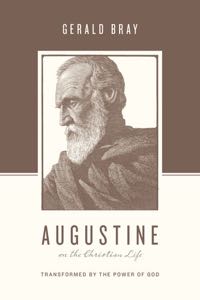Reviewed by Andrew Spencer
Augustine is a perpetual topic of study among theologians and philosophers. As such, the field of literature on the life and thought of Augustine of Hippo is crowded. Peter Brown’s book, Augustine of Hippo: A Biography (Rev. Ed.; Berkeley, CA: University of California Press, 2000), remains at the top of the heap for historical biographies on the Bishop of Hippo. Henry Chadwick’s volume, Augustine of Hippo: A Life (New York: Oxford University Press, 2010), is still the intellectual biography that best fills in the gaps that Brown left. However, Gerald Bray makes a significant contribution to Augustine studies with his recent Crossway volume, Augustine on the Christian Life: Transformed by the Power of God.
Bray is research professor of divinity, history and doctrine at Beeson Divinity School and director of research for the Latimer Trust. He is a significant theologian and church historian who has prolifically published works that benefit of the church. Bray brings his depth of knowledge and writing talent to bear in this recent biography of Augustine. Like the other volumes in the Crossway Theologians on the Christian Life series, this book demonstrates academic rigor in tandem with engaging prose. Bray illuminates the life of Augustine as disciple and as pastor in a way that is sure to be a blessing to the contemporary reader.
Summary
In his approach to this volume, Bray presents the life and thought of Augustine in five chapters. In Chapter One, Bray summarizes the basic facts of Augustine’s biography, his historical and cultural context, the nature of his written work, and some of his basic doctrinal beliefs. The second chapter presents an account of Augustine’s spiritual journey, beginning with his conversion, then considering his devotional practices, his personal values, his choice of the celibate lifestyle, and his overall understanding of the life of faith. Chapter Three outlines Augustine’s doctrine of Scripture, his hermeneutics, and some of the major contours of his theology. In the fourth chapter, Bray presents the life of Augustine as Bishop. This includes the practical and theological aspects of Augustine’s concept of the church, of preaching, and his heart for the world. Finally, Chapter Five summarizes the contemporary understanding of Augustine and why he is important for Christians today.
Evaluation
This volume is an excellent introduction to Augustine from an Evangelical perspective. It succeeds in avoiding hagiography as Bray is appropriately critical throughout. He respects Augustine’s context, offering grace accordingly; however, at the same time he holds the theology and practice of this Doctor of the Church against the standard of Scripture. What results is a spiritually rich biography that celebrates the strengths and recognizes the weakness of a giant of the Christian faith. Bray’s biography is helpful in bringing Augustine into the Twenty-First century while retaining his integrity as the last of the Ancients.
In addition to its value as a biography, this volume is a tool for equipping the saints. Bray encourages the modern disciple to study the original languages of Scripture by pointing out some of Augustine’s errors due to his use of flawed translations. At the same time, Bray offers hope to those that are ill-equipped to study Scripture in Greek and Hebrew, since Augustine was often theologically correct because of his understanding of the whole of Scripture despite being exegetically wrong in his treatment of particular passages. Bray also exhorts pastors to the study of rhetoric, noting, “the modern preacher is seldom trained in rhetoric, with the result that sermons nowadays are often eminently forgettable, and many people regard them as the low point of public worship” (p. 171). By Augustine’s example, Bray offers lessons for the church of today.
The most significant weakness of this volume is the infrequency of clear divisions in the text. At just over 200 pages, some of the chapters are rather long for bedtime reading. In the third and fourth chapter particularly, the sections will stretch the attention span of some readers. While this does not impact the overall quality of the volume, more frequent divisions would have improved its readability. Roman Catholic readers may also object to some of the critiques offered of Augustine’s theology, since Bray unapologetically writes from a Protestant worldview. This, however, makes it a more useful text for reaching Evangelical laity.
Augustine on the Christian Life is a good way to introduce someone with little theological training to an important Christian thinker. This book is clearly written to be accessible while being amply researched, giving it a robust theological footprint. It is a text on a towering figure of Church History that could only have been written by a seasoned theologian like Gerald Bray. In short, this is a volume that belongs on the shelves of pastors and parishioners. More importantly, it is a book that deserves to be widely read throughout the Church.
Andrew J. Spencer is Director of Assessment and Institutional Research at Oklahoma Baptist University
